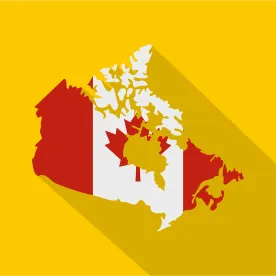The House of Commons has passed the third reading related to the Cannabis Act (the “Act”). Scheduled to come into force no later than July 2018 (subject to Parliamentary approval and Royal Assent), the new law will permit the recreational use of cannabis and sets out the provisions to regulate its possession, production, distribution, and sale. The Act is in addition to the existing Access to Cannabis for Medical Purposes Regulations under the Controlled Drugs and Substances Act, which, subject to some coordinating amendments with the Act, will remain in force.
The push by the federal government to have its cannabis legislation in place by July 2018 has left provincial governments and industry regulators scrambling to draft their own legislation and guidelines. In the haste to legislate cannabis in Canada, a glaring concern remains for industry participants and investors: cannabis continues to be a prohibited substance under U.S. federal law but is permitted under certain state laws that have legalized cannabis-related activities.
This, in turn, has left Canadian reporting issuers with U.S.-related cannabis activities uncertain of their treatment by the Canadian Securities Administrators (“CSA”) and the Toronto Stock Exchange (“TSX”). To complicate matters further, the Department of Justice issued guidance in 2013 that it would not generally enforce the federal prohibitions of any U.S. state that has authorized marijuana activity through enforcement of their own narcotics laws so long as such states have implemented a strong and effective regulatory framework. However, the federal guidance is subject to change, rescission, or alteration at any time. In the event the U.S. federal prohibition is enforced, there could be material consequences for an issuer with U.S. marijuana-related activities, including prosecution and asset seizure.
CSA
In CSA Staff Notice 51-352, Issuers with U.S. Marijuana-Related Activities, the CSA has acknowledged that while most jurisdictions have a uniform national framework for marijuana regulation, there remains a conflict between U.S. state and federal law.
Securities regimes across Canada are primarily disclosure-based. Disclosure must be timely and accurate to ensure that material facts and risks are presented fairly in order for investors to make informed investment decisions. The CSA takes a disclosure-based approach premised on the assumption that marijuana-related activities are conducted in compliance with the current laws and regulations of a U.S. state where such activities are legal. The Staff Notice outlines the specific disclosure necessary to fairly present all material facts, risks, and uncertainties and imposes disclosure requirements according to the following categories: (i) all issuers with U.S. marijuana-related activities; (ii) U.S. marijuana issuers with direct involvement in cultivation or distribution; (iii) U.S. marijuana issuers with indirect involvement in cultivation or distribution; and (iv) U.S. marijuana issuers with material ancillary involvement.
The CSA expects that disclosures and any risks be evaluated and monitored on an ongoing basis and amended and communicated as necessary immediately to investors in public filings. U.S. marijuana issuers who do not provide appropriate disclosure may be subject to receipt refusal in the context of prospectus offerings, requests for restatements of non-compliant filings, and referrals for appropriate enforcement action.
The CSA has stated that if an exchange lists a U.S. marijuana issuer that discloses the risks in accordance with the Staff Notice, the listing does not change the treatment of the issuer’s marijuana-related activities under U.S. federal law.
TSX
The TSX is aware that a number of U.S. states have legalized the cultivation, distribution, or possession of marijuana to varying degrees and subject to various conditions. However, the TSX has noted that marijuana remains a Schedule I drug under the U.S. federal Controlled Substances Act, which means it is illegal under U.S. federal law to cultivate, distribute, or possess marijuana in the U.S. Moreover, financial transactions involving proceeds generated by or intended to promote marijuana-related business activities in the U.S. could form the subject for a prosecution under U.S. federal money laundering legislation.
Issuers with ongoing business activities that violate U.S. federal law are not complying with the TSX Company Manual as indicated in Staff Notice 2017-00009. Business activities may include (i) direct or indirect ownership or investment in entities engaged in activities related to the cultivation, distribution, or possession of marijuana in the U.S.; (ii) commercial interests or arrangements with entities engaged in activities related to the cultivation, distribution, or possession of marijuana in the U.S. that are similar to ownership of or investment in such entities; (iii) providing services or products that are designed for or targeted at entities engaged in activities related to the cultivation, distribution, or possession of marijuana in the U.S.; or (iv) commercial interests or arrangements with entities engaging in the business activities described in (iii). The business activities in (iii) or (iv) are referred to as Ancillary Services Activities.
In the context of the TSX’s continued listing review of listed issuers in the marijuana sector, TSX expects to group issuers into two categories:
-
Category 1 is composed of issuers with business activities that involve the cultivation, distribution, or possession of marijuana in any jurisdiction.
-
Category 2 is composed of issuers that do not cultivate, distribute, or possess marijuana but appear to be engaging in Ancillary Services Activities.
TSX has determined that issuers operating in violation of U.S. federal law are not acting in compliance with TSX listing requirements. Accordingly, TSX may exercise its discretion to initiate a delisting of issuers engaged in such activities under Part VII of the TSX Company Manual.
Gaming and Cannabis
The Nevada Gaming Commission has taken the position that as long as marijuana is illegal under U.S. federal law, gaming licensees must not have any involvement with or participate in the marijuana industry – doing so would violate the requirement for licensee to obey all laws, including federal laws.
The proposed cannabis legislation in Canada contemplates each province regulating marijuana-related activities. Under the proposed Cannabis Act, the federal government would generally be responsible for setting conditions and licensing the cultivation and manufacture of cannabis and its related products, while provinces and territories will generally be responsible for regulating their distribution and retail sale. In Ontario, the regulator will be the Alcohol and Gaming Commission of Ontario (“AGCO”).
In our assessment, and unlike the position in Nevada, we believe AGCO will not object to any gaming registrant or qualifier participating in a legal marijuana program stipulated by federal legislation if enacted in July 2018. However, in a jocular vein, we very much doubt that AGCO will be renamed as “Alcohol, Gaming, and Marijuana Commission of Ontario.”





 />i
/>i

